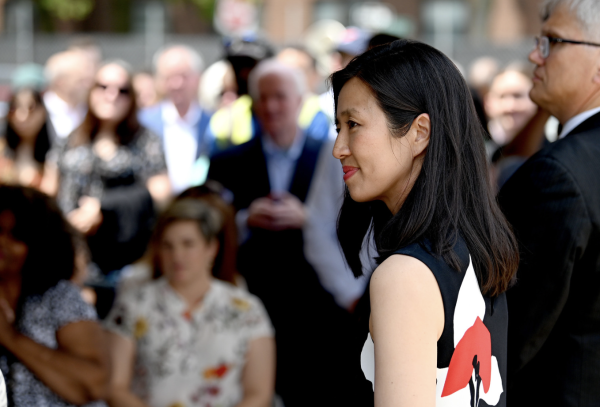June 16, 2023

Mayor Wu sent the city budget back to councillors, rejecting cuts to various city departments, including Boston Police and Public Works. (Isabel Leon/Mayor's Office photo)
Mayor Michelle Wu on Friday rejected the City Council’s proposed cuts to Boston Police and a host of other city departments, including veterans affairs and the Boston Public Library.
Councillors voted 7-5 earlier this week on a $4.2 billion operating budget that included $53 million in amendments, boosting some accounts but cutting from others, including $31 million from the police and $900,000 from veterans services. Councillors Frank Baker, Ed Flynn, Gabriela Coletta, Michael Flaherty and Erin Murphy opposed the cuts.
In a letter to the City Council on Friday, Wu said the cut to police was “illusory,” because the city is “obligated to cover salary and overtime expenses incurred by the department.”
Cuts to public works and transportation departments would lead to “holding positions vacant and delaying hiring for critically needed positions in both departments to fill potholes, upgrade crosswalks, plow snow, and ensure our street infrastructure is safe,” Wu’s letter said.
“As the City’s elected officials, we have a collective responsibility to protect core City functions,” she added.
Veto overrides require eight votes out of the 12-member Council. The body, which stands at 13 members when at full strength, is down a councillor due to Kenzie Bok’s departure for the top job at the Boston Housing Authority.
Councillor Tania Fernandes Anderson, who chairs the amendment-writing Ways and Means Committee, has claimed the proposed cuts would not lead to layoffs, and argued various city departments have unspent funds that can be tapped.
While Wu rejected most of the high-dollar cuts, she did accept some amendments from councillors, including increased funding for maternal and men’s health initiatives, fire safety and worker protections, support for newly arriving migrants, constituent service technologies, housing vouchers, a childcare entrepreneur fund, and a needs assessment for future senior programming.
“These amendments support the need to deliver on City services and make Boston the best city for residents of all generations,” Wu’s letter said.
RELATED: Divided councillors vote to send city budget to Mayor Wu after clash over police funds
Wu also wrote that she is keeping the new Office of Participatory Budgeting to a $2 million budget. Councillors had approved $10 million, while activists sought $40 million.
According to activists who have pushed for the office, the process involves “everyday people proposing projects in their neighborhoods,” ranging from park improvements to public art. While the office is staffing up, its oversight board hasn’t been filled out yet.
“We share the Council’s goal of a participatory budgeting process that engages more of our residents in the challenging and empowering work of crafting future City budgets,” she wrote.
The Council, which is typically off next week, has scheduled a special meeting on Wednesday, June 21, in order to receive Wu’s veto message.
Councillors cannot act on the veto the same day as they receive it, so they are expected to take up the budget again on Wednesday, June 28. If they do not act on the budget before the end of the month, the mayor’s version goes into effect.
During last year’s budget cycle, councillors passed $26 million in amendments, including a $13.3 million cut to the police budget, much of it from overtime. The independent Boston Municipal Research Bureau (BMRB) later noted that police overtime must be paid out by law, “regardless of how much was budgeted originally.” Wu ended up reducing the overall police budget $1.2 million.
Councillors overrode a total of $2.1 million in amendments. After the fiscal 2023 budget process ended, the Council had redistributed $9.9 million, or 0.6 percent, of budget appropriations they had the authority to amend, per BMRB.


